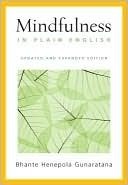More on this book
Community
Kindle Notes & Highlights
MEDITATION IS NOT EASY. It takes time and it takes energy. It also takes grit, determination, and discipline. It requires a host of personal qualities that we normally regard as unpleasant and like to avoid whenever possible. We can sum up all of these qualities in the American word gumption. Meditation takes gumption.
Just because of the simple fact that you are human, you find yourself heir to an inherent unsatisfactoriness in life that simply will not go away. You can suppress it from your awareness for a time; you can distract yourself for hours on end, but it always comes back, and usually when you least expect it.
Life seems to be a perpetual struggle, an enormous effort against staggering odds. And what is our solution to all this dissatisfaction? We get stuck in the “if only” syndrome. If only I had more money, then I would be happy. If only I could find somebody who really loved me; if only I could lose twenty pounds; if only I had a color TV, a hot tub, and curly hair; and on and on forever.
The essence of our experience is change. Change is incessant. Moment by moment life flows by, and it is never the same.
What we really seek is not the surface goals; those are just means to an end. What we are really after is the feeling of relief that comes when the drive is satisfied. Relief, relaxation, and an end to the tension. Peace, happiness — no more yearning.
You can learn to control your mind, to step outside of the endless cycle of desire and aversion. You can learn not to want what you want, to recognize desires but not be controlled by them.
We are just beginning to realize that we have overdeveloped the material aspects of existence at the expense of the deeper emotional and spiritual aspects, and we are paying the price for that error.
You can’t make radical changes in the pattern of your life until you begin to see yourself exactly as you are now.
It is one thing to obey the law because you know the penalties and fear the consequences; it is something else entirely to obey the law because you have cleansed yourself from the greed that would make you steal and the hatred that would make you kill.
You feel love toward others because you understand them, and you understand others because you have understood yourself. You have looked deeply inside and seen self-illusion and your own human failings, seen your own humanity and learned to forgive and to love. When you have learned compassion for yourself, compassion for others is automatic.
The meaning of faith here is closer to confidence. It is knowing that something is true because you have seen it work, because you have observed that very thing within yourself.
morality is not a ritualistic obedience to a code of behavior imposed by an external authority. It is rather a healthy habit pattern that you have consciously and voluntarily chosen to impose upon yourself because you recognize its superiority to your present behavior.
The purpose of meditation is personal transformation. The “you” that goes in one side of the meditation experience is not the same “you” that comes out the other side. Meditation changes your character by a process of sensitization, by ...
This highlight has been truncated due to consecutive passage length restrictions.
There is only one way you will ever know if meditation is worth the effort: learn to do it right, and do it. See for yourself.
watch the functioning of your own mind in a calm and detached manner so you can gain insight into your own behavior.
Meditate, and you will probably dredge up various nasty matters from your past. The suppressed material that has been buried for quite some time can be scary. But exploring it is also highly profitable. No activity is entirely without risk, but that does not mean that we should wrap ourselves in a protective cocoon. That is not living, but is premature death. The way to deal with danger is to know approximately how much of it there is, where it is likely to be found, and how to deal with it when it arises.


